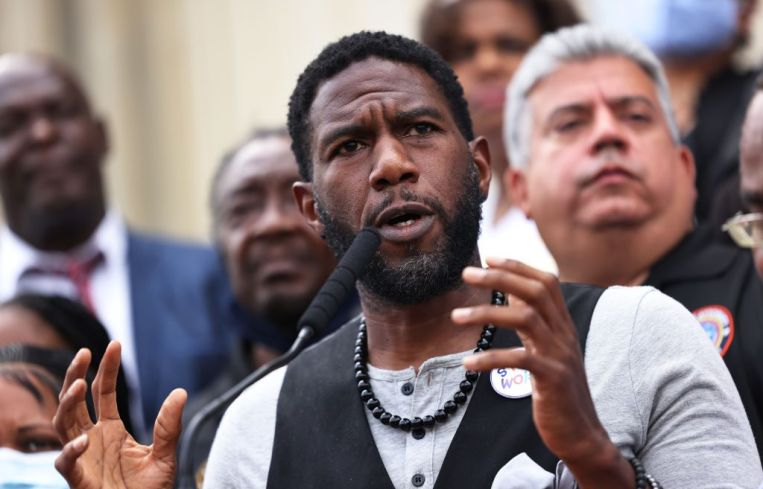In Jumaane Williams’ Run for Governor, Real Estate Unlikely to Be in His Corner
By Aaron Short September 29, 2021 10:42 am
reprints
Jumaane Williams is preparing to run for governor of New York, but he will likely do so without the real estate community in his corner.
The New York City public advocate announced Tuesday that he had opened an exploratory committee to start raising money for a statewide campaign in a rematch of his 2018 lieutenant governor’s race against Gov. Kathy Hochul, according to The New York Times.
“My goal in public service is to fight for the people, against injustice and inertia. What’s wrong, and what’s stopping those in power from making it right,” Williams tweeted Tuesday afternoon. “As our state works to recover from COVID and move forward from scandal, I’m exploring a run for governor to renew New York.”
In a message to campaign supporters, the progressive pol said he would tour the state over the next month and lean on a group of left-wing leaders, including Brooklyn City Council members Brad Lander and Antonio Reynoso, for advice. Williams had already been dialing donors and insiders to give them a heads-up of his candidacy, the New York Post reported.
However, real estate leaders aren’t likely to line up behind him.
“I can’t think of any real estate industry figure that would have any reason to support Jumaane,” one real estate insider told Commercial Observer. “He is an unabashed critic of tax incentives. I can’t think of a single development project he supported.”
Developers will have many candidates to choose from after Andrew Cuomo’s shocking resignation last month.
Attorney General Letitia James has been quietly discussing a gubernatorial bid among aides and prospective donors, although she has publicly said she is focused on her current job. Long Island Democratic Congressman Tom Suozzi has said he’d like to be governor one day and Suffolk County Executive Steve Bellone is also reportedly interested. And Hochul has already brought in several staffers with seasoned campaign experience for her run, plus has already won high marks from the real estate industry.
On the Republican side, Suffolk County Congressman Lee Zeldin is racking up endorsements and Andrew Giuliani, the former mayor’s son, announced a run in May, explaining in a phrase that has never been uttered in American newsprint, “I’m a politician out of the womb.”
Williams once had a cordial, working relationship with the real estate industry when he chaired the New York City Council’s Housing Committee between 2014 and 2017. He pressured Mayor Bill de Blasio to bolster construction safety training requirements while opposing the mayor’s mandatory inclusionary zoning proposal in 2016, because it didn’t mandate below-market housing units in wealthier neighborhoods that had historically objected to them. (The de Blasio administration arguably came around to Williams’ thinking in its SoHo and NoHo rezoning.)
But as Williams waged his lieutenant governor campaign in 2018 and public advocate bids the following year, he made tenant advocacy a centerpiece of his candidacy in Albany. He was arrested while demonstrating outside then-Gov. Cuomo’s office in June 2019, demanding that the legislature pass stronger rent regulations before its expiration. And he has opposed the 421a tax abatement for new developments, which expires next June, once co-writing a New York Daily News op-ed with Letitia James that the program is a “handout for the rich.”
During the pandemic, he demanded a rent freeze before a Rent Guidelines Board vote on rents at New York City’s stabilized units. Then, in January, Williams nominated tenant activist Cea Weaver, who called for rent payments to be canceled altogether, to the City Planning Commission. After public pressure, he withdrew her name a month later. And the City Council approved a bill in June, spearheaded by Williams and Council Member Rafael Salamanca, that would require certain land-use projects and neighborhood rezonings to include a racial-impact study, in an effort to help curb the displacement of residents from rezoned neighborhoods. (The Real Estate Board of New York pushed back against earlier versions of the bill, but said it supported the version ultimately passed.)
Jay Martin, executive director of the Community Housing Improvement Program, a group for property owners and managers, thinks Williams should tone down anti-landlord rhetoric to be successful statewide.
“We have had enough divisive politics over the past few years,” he said. “Voters don’t want a governor who vilifies an industry for cheap political points.”
Williams nearly nipped Hochul with that strategy when they faced off for the state’s No. 2 job. But Hochul prevailed in the state’s September primary 53 to 47 percent.
Now, Williams will likely tap into national progressive networks and sites like ActBlue for a bevy of small donors. But he could struggle to rein in big donors when his opponents are likely to tap into developers’ deep pockets.
He raised about $260,000 during the state primary for his 2018 race and hauled in another $319,000 in private funds for a 2019 special election for public advocate, state and city campaign filings show. He received $1.1 million in public funds that year, but state races don’t have the city’s generous 8-to-1 matching funds program.
“It’s an interesting test to his viability,” one Democratic donor in the real estate community said. “If he raises half a million bucks, he is viable. If he raises $76,000, he’s not.”



